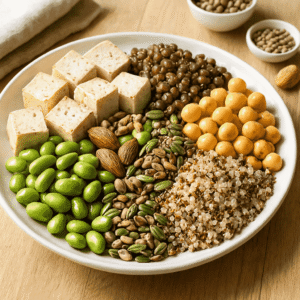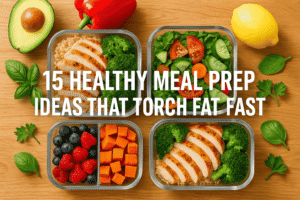Discover essential nutrition tips for every stage of pregnancy! From vital nutrients to meal ideas, learn how to support your health and your baby’s growth with our comprehensive guide to pregnancy nutrition and diet for each trimester.
Introduction

Proper nutrition during pregnancy is essential for the health and development of both the mother and baby. The right foods can help manage common pregnancy challenges like morning sickness, fatigue, and food aversions while providing the body with the nutrients needed for each stage of growth. In this guide, we’ll explore essential nutrients for each trimester and offer practical tips on what to eat to ensure a healthy pregnancy.
Why Nutrition Matters in Pregnancy
Each trimester has unique nutritional requirements as the baby grows and the mother’s body adapts to support this development. A balanced diet, rich in vitamins, minerals, and protein, can ease discomforts, prevent complications, and promote a healthy start to life for your baby.

Essential Nutrients for Each Trimester
First Trimester: Foundational Nutrition

The first trimester is a critical time for the baby’s neural development and the formation of major organs. Folic acid is crucial here, as it supports the neural tube development, which becomes the baby’s brain and spinal cord.
- Folic Acid: Found in leafy greens, oranges, beans, and fortified cereals, folic acid reduces the risk of neural tube defects.
- Vitamin B6: Helps alleviate morning sickness. Try bananas, avocados, and chicken breast to incorporate this vitamin.
- Protein: Essential for muscle development. Include lean meats, tofu, and eggs in your diet.
Food Suggestions for the First Trimester:
- Breakfast: Oatmeal topped with banana and a handful of nuts.
- Lunch: Quinoa salad with leafy greens, beans, and avocado.
- Dinner: Grilled chicken breast with a side of steamed broccoli and carrots.
Second Trimester: Building Strength and Stamina

In the second trimester, the focus shifts to calcium for bone development, iron to prevent anemia, and protein for continued muscle and tissue growth.
- Calcium: Vital for building your baby’s bones and teeth. Great sources include dairy products, almonds, and leafy greens.
- Iron: Helps in making extra blood for you and your baby, reducing the risk of anemia. Try foods like lentils, red meat, and fortified cereals.
- Vitamin D: Supports calcium absorption. Get it from fortified milk or spend time outdoors for natural sunlight exposure.
Food Suggestions for the Second Trimester:
- Breakfast: Smoothie with Greek yogurt, berries, and a handful of spinach.
- Lunch: Salmon (low mercury) with a side of quinoa and kale.
- Dinner: Stir-fried tofu with bell peppers, broccoli, and brown rice.
Third Trimester: Fueling for the Finish Line

The third trimester is all about preparing for birth and supporting the baby’s final growth stages. Key nutrients include omega-3 fatty acids for brain development, additional calories for energy, and continued intake of iron and calcium.
- Omega-3 Fatty Acids: Essential for brain and eye development. Include walnuts, chia seeds, and low-mercury fish like salmon.
- Iron & Calcium: Continue incorporating iron-rich and calcium-rich foods to sustain both the mother’s and baby’s needs.
- Vitamin K: Important for blood clotting, which becomes essential during delivery. Foods like green leafy vegetables and broccoli are high in Vitamin K.
Food Suggestions for the Third Trimester:
- Breakfast: Chia pudding with a topping of fresh berries and nuts.
- Lunch: Grilled chicken wrap with mixed greens and a side of yogurt.
- Dinner: Baked salmon with sweet potatoes and a side salad.
Key Nutrients for Overall Pregnancy Health

Regardless of trimester, some nutrients are necessary throughout the entire pregnancy for optimal health.
- Water: Staying hydrated is vital, as dehydration can cause preterm contractions and other complications.
- Fiber: Helps prevent constipation, a common pregnancy issue. Include whole grains, fruits, and vegetables.
- Antioxidants: Strengthen the immune system. Berries, green tea, and leafy greens are excellent sources.
Foods to Avoid During Pregnancy

Certain foods should be avoided to prevent health risks to both mother and baby.
- High-Mercury Fish: Avoid fish like swordfish and king mackerel.
- Raw/Undercooked Meat: To reduce the risk of bacterial infections, make sure all meat is thoroughly cooked.
- Unpasteurized Dairy and Juices: These can carry harmful bacteria.
Sample Meal Plans for Each Trimester

First Trimester Meal Plan:
- Breakfast: Whole-grain toast with avocado and scrambled eggs.
- Snack: Apple slices with almond butter.
- Lunch: Lentil soup with a side of mixed greens.
- Dinner: Baked cod with a side of quinoa and roasted Brussels sprouts.
Second Trimester Meal Plan:
- Breakfast: Greek yogurt with berries and honey.
- Snack: Carrot sticks with hummus.
- Lunch: Turkey sandwich with whole-grain bread and leafy greens.
- Dinner: Veggie stir-fry with brown rice and tofu.
Third Trimester Meal Plan:
- Breakfast: Chia pudding with sliced almonds and banana.
- Snack: Orange slices with cottage cheese.
- Lunch: Grilled chicken salad with mixed greens, cucumber, and olive oil dressing.
- Dinner: Spaghetti with a tomato-based veggie sauce and a side of green beans.
Tips for Managing Common Pregnancy Nutrition Challenges

Pregnancy often brings a few nutrition-related challenges. Here are some tips:
- Morning Sickness: Eat small, frequent meals with high protein to manage nausea.
- Food Aversions: Experiment with different food textures or temperatures to see what feels manageable.
- Cravings: Focus on healthy versions of your cravings. For instance, if craving sweets, try a smoothie with berries.
Conclusion
Ensuring proper nutrition throughout pregnancy helps support both the mother’s health and the baby’s growth and development. From key nutrients to managing common pregnancy challenges, following a trimester-specific diet rich in whole foods, lean proteins, and essential vitamins and minerals can make a world of difference. Always consult your healthcare provider for personalized advice on your pregnancy journey.
FAQ’s
1. What are the most important nutrients during pregnancy?
The most important nutrients during pregnancy include folic acid, iron, calcium, protein, and omega-3 fatty acids. These support the baby’s neural development, bone growth, and general health while maintaining the mother’s energy and overall well-being.
2. Why is folic acid important in early pregnancy?
Folic acid is crucial in early pregnancy as it helps prevent neural tube defects, which affect the brain and spinal cord development in the baby. It’s especially important during the first trimester and is often recommended as a supplement before conception and throughout early pregnancy.
3. How much weight should I gain during pregnancy?
Healthy weight gain during pregnancy depends on your pre-pregnancy weight and BMI. Generally, weight gain of 25–35 pounds is recommended for women with a normal BMI. Your healthcare provider can provide personalized guidance based on your body type and needs.
4. What foods should I avoid during pregnancy?
During pregnancy, avoid high-mercury fish (e.g., swordfish, king mackerel), raw or undercooked meat and eggs, unpasteurized dairy, and excessive caffeine. These foods can increase the risk of foodborne illnesses and other health concerns.
5. Can I take vitamin supplements instead of focusing on diet?
While prenatal vitamins are recommended to ensure you’re getting essential nutrients, they’re not a replacement for a balanced diet. Eating nutrient-dense foods provides a range of vitamins, minerals, and other beneficial compounds that are difficult to get from supplements alone.
6. What can I eat if I experience morning sickness?
If you experience morning sickness, try eating small, frequent meals rich in protein and low in fat. Bland foods like crackers, dry toast, or oatmeal can help. Ginger tea or ginger candies may also reduce nausea.
7. Is it safe to exercise during pregnancy, and how does it affect nutrition?
Yes, moderate exercise is usually safe and beneficial for most pregnant women. However, you may need extra calories and nutrients to support your activity level and pregnancy needs. Consult your healthcare provider to tailor your diet and exercise routine.
8. How can I manage cravings during pregnancy without compromising nutrition?
Satisfy cravings with nutritious alternatives. For example, if you crave sweets, try fruits or yogurt. If you crave salty snacks, opt for air-popped popcorn or whole-grain crackers with a light sprinkle of sea salt.
9. How can I ensure I’m getting enough protein during pregnancy?
Include protein sources like lean meats, eggs, dairy products, legumes, nuts, and seeds in your daily meals. Aim for a balanced diet that includes a variety of protein sources to meet your nutritional needs.
10. Are there any special dietary considerations for vegetarians or vegans during pregnancy?
Yes, vegetarians and vegans may need to focus on plant-based sources of protein, iron, calcium, and omega-3s. Foods like lentils, beans, tofu, fortified plant-based milk, and leafy greens can provide these nutrients. A healthcare provider can suggest supplements if necessary.
11. How much water should I drink during pregnancy?
Pregnant women should aim for about 8–10 glasses (64–80 ounces) of water per day. Staying hydrated supports the increased blood volume in pregnancy and helps prevent common issues like constipation and urinary tract infections.
12. What are some quick meal ideas for pregnant women with busy schedules?
Quick meal ideas include yogurt parfaits with fruits and nuts, whole-grain wraps with lean protein and veggies, overnight oats with chia seeds, and smoothies with spinach, berries, and Greek yogurt. These options are nutrient-dense and easy to prepare.
13. Should I avoid caffeine completely during pregnancy?
It’s best to limit caffeine intake to 200 mg per day, which is about one 12-ounce cup of coffee. Excessive caffeine is associated with a higher risk of miscarriage and other pregnancy complications, so moderation is key.





Comments are closed.